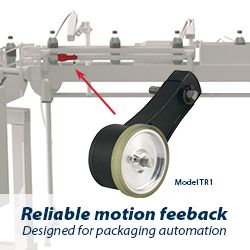Winners of SICK, Inc.’s TiM$10K Challenge Announced
For the 2018-2019 school year, SICK, Inc. invited students from universities around the country to participate in the first ever TiM$10K Challenge, created to support innovation and student achievement in automation and technology.
MINNEAPOLIS, MINN., APRIL 30, 2019 - For the 2018-2019 school year, SICK, Inc. invited students from universities around the country to participate in the first ever TiM$10K Challenge, created to support innovation and student achievement in automation and technology.
The winners of the TiM$10K Challenge are:
• 1st Place: Texas A&M University Team 2 - Foreign object detection on airport tarmacs
• 2nd Place: Texas A&M University Team 1 - Visual impairment walking aid
• 3rd Place: Purdue University - Low-friction test bed for CubeSats (micro satellites)
Project Summaries
Texas A&M University Team 2 used the SICK LiDAR sensor to detect foreign object debris (FOD) on airport tarmacs, like screws or metal strips from planes. Each year, FOD costs the aviation industry billions of dollars in airplane repairs. FOD also has potential deadly consequences if not maintained properly. The system built by this team is an AGV that drives around the tarmac and detects any FOD with the LiDAR sensor.
The second place team, Texas A&M University Team 1, developed a walking aid for the visually impaired using the SICK LiDAR sensor. Instead of implementing the device in a cane or other walking aid, the team created a wearable device that provides a person an audio warning in advance of an obstacle. The LiDAR sensor is used to detect the upcoming obstacles. This walking aid is intended to be used as a complement to the white cane.
Finally, the team from Purdue University created a low-friction test bed to test CubeSats, which are micro satellites. These are commonly used in experiments to demonstrate new technology in Low Earth Orbit. One major application of these micro satellites are rendezvous proximity operations, where a LiDAR sensor is used to accurately track its position to another object. The team developed a low-friction test bed and a micro satellite, TracSat.
Contest Background
Each team was asked to submit a video and paper for judging upon completion of the project. A panel of judges decided the winning submissions based on creativity and innovation, ability to solve a customer problem, commercial potential to productize and market the application, entrepreneurship of the team, and reporting.
The three winning teams win a cash award of $10K for first place, $5K for second place, and $3K for third place. In addition to bragging rights and the cash prize, the first place team, along with the advising professor, will go on an all-expense paid trip to Germany to visit the SICK headquarters and manufacturing facility in summer 2019.
This contest was supported by PMMI Foundation's U Skills Fund. PMMI Foundation works to grow awareness of careers in packaging and processing, providing assistance to schools and programs that develop students to excel in the industry.
LiDAR Sensor Technology
The LiDAR sensor (TiM) provided to teams utilizes a rotating pulsed laser to calculate distances to its surroundings based on the time-of-flight principle. The rotating laser effectively forms a circle around the TiM, inside which users can create individual fields to monitor for the presence or absence of an object. The reliability of the sensor is improved by SICK's patented High-Definition Distance Measurement (HDDM) technology, which samples each measurement several times and averages the results.
As the TiM$10K teams ably proved, monitoring the individual fields for objects can be a great way to solve applications that other sensing technologies cannot. This makes the TiM invaluable in a variety of industrial applications, as well as building automation, stationary, and mobile applications. In addition, the integrated Ethernet interface allows for remote monitoring, measurement, and navigation which presented a ton of creative possibilities for the TiM$10K teams.
Register for the 2019-2020 TiM$10K Challenge
SICK is now accepting entries for the TiM$10K Challenge for the 2019-2020 school year! Student teams can register online by September 2, 2019. Student teams are encouraged to use their creativity and technical knowledge to incorporate the SICK LiDAR for any industry in any application. Advisors/professors are allowed to guide the student teams as required. For more details, visit: https://ptdrv.linkedin.com/o6037k5
About SICK
SICK is one of the world's leading manufacturers of sensors, safety systems, machine vision, encoders and automatic identification products for industrial applications. With more than 1000 patents, SICK continues to lead the industry in new product innovations. The diversity of its product line allows SICK to offer solutions at every phase of production in the logistics, automotive, packaging, electronics, food and beverage, and material handling markets. SICK AG was founded in 1946 and has operations or representation in 65 countries worldwide.
http://www.sickusa.com
Featured Product

Model TR1 Tru-Trac
The Model TR1 Tru-Trac® linear measurement solution is a versatile option for tracking velocity, position, or distance over a wide variety of surfaces. An integrated encoder, measuring wheel, and spring-loaded torsion arm in one, compact unit, the Model TR1 is easy to install. The spring-loaded torsion arm offers adjustable torsion load, allowing the Model TR1 to be mounted in almost any orientation - even upside-down. The threaded shaft on the pivot axis is field reversible, providing mounting access from either side. With operating speeds up to 3000 feet per minute, a wide variety of configuration options - including multiple wheel material options - and a housing made from a durable, conductive composite material that minimizes static buildup, the Model TR1 Tru-Trac® is the ideal solution for countless applications.
